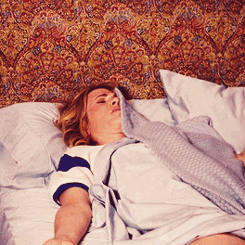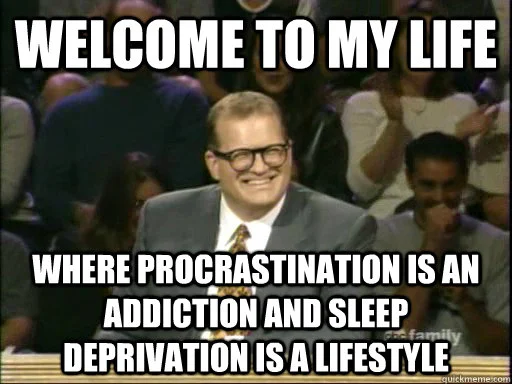This post was inspired by a conversation with one of my besties Grace. We were talking about sleep and how we knew we probably weren't getting enough, but hello, no one is. That got me thinking... I've heard the 7-8 hour bit before. But what's actually going on as I sleep? How come I feel so "blegh" without sleep? Are my crappy sleep habits going to cause problems later on in life?
People always tell you to get a good night's rest. But these days it seems like we consider sleep a luxury and not a necessity. How many times have you been at work daydreaming about your bed… but then you get home and have a million things to do and well, next thing you know it’s already the morning and you're almost more tired then when you went to bed? Maybe that all nighter helped you get ahead on work or a project, but you might be paying for it in the long haul.
Sleep 101
The National Institute of Health recommends 7-8 hours of sleep for adults. Some people may need up to 9, but each person is different. Brain wave scans have shown us that each sleep cycle can be broken down into 5 stages. Each phase of sleep serves a purpose; during some you create new memories, make new connections between brain cells (i.e. learn), and “fix up” neurons that get worn out during the day. During 8 hours of undisturbed sleep you will go through the full cycle about 4 to 5 times.
Sleep is important because it allows the brain to reset itself. During the day your brain builds up chemical waste from working so hard (i.e. LIVING). Think of it this way: Sleep is like the janitorial crew which comes in to clean up an office. Trash gets generated just from normal day to day activities. When the crew has a full shift the office looks spotless and the office workers (brain cells) have an easier time doing their jobs. Now let’s say you start cutting hours for the night crew (i.e. not getting enough sleep). Suddenly the trash doesn’t get taken out, carpets are dirty, and the office is a mess which makes it difficult for the workers to do their jobs.
Problems associated with not getting enough zzz’s
Tons of research is coming out about the effects of sleep deprivation (not getting any) and sleep restriction (more common). Here's the cliffnote version of the problems you may face:
* Lapses of attention, reduced cognitive thought, slowed working memory and delayed reaction times
* More likely to experience irritability, mood disturbances, depression, anxiety, and pain
* Higher risk of developing obesity, heart disease, diabetes
* Higher risk of developing neurological disorders like PTSD, Alzheimer’s, and dementia
* Oh and you might be more likely to just die earlier (yikes!)
Tons of studies are out there have also examined the impact of sleep deprivation on performance of doctors, nurses, third shift workers, athletes, teenagers, etc. The common finding? Not getting 7+ hours of sleep makes you more likely to make mistakes and have a harder time learning new skills. Not all of us command life or death situations like surgeons, but most of us don’t want to suck at our jobs. And maybe the extra sleep will make you enjoy it a little more too!
What’s the big deal? I’ll just have an extra shot of espresso tomorrow!
Here’s something that surprised me. One study found that people who got only 4-6 hours of sleep for more than 14 days in a row did not report feeling sleepy after the 14 days. Logically we think you have "adjusted" to that lower level of sleep. So you don’t feel tired yet your brain is NOT able to regenerate and restore itself properly. This is food for thought if you are one of those “I only need 4 hours of sleep!” people.
Coffee and napping have been found to improve concentration and decrease sleepiness if needed, but research is starting to show that it doesn’t substitute for a full night’s sleep. Thinking back to our analogy, it’s like a one of the janitors shows up for an hour or so to help. That will tidy things up but it doesn’t substitute for a full cleaning crew all night! Also, you don’t get the other benefits of sleep such as repairing cells.
Ok, you got me. But how do I get more sleep?
The National Institute of Health recommends the following:
* Go to bed at the same time each night, and rise at the same time each morning.
* Sleep in a quiet, dark, and relaxing environment, which is neither too hot nor too cold.
* Make your bed comfortable and use it only for sleeping and not for other activities, such as reading, watching TV, or listening to music.
* Remove all TVs, computers, and other "gadgets" from the bedroom.
* Avoid large meals before bedtime.
I blame my crappy sleep habits on college, especially grad school. I can’t really use that excuse anymore so I’ve been trying to be better. So far I’ve made two big changes to get more zzz’s.
1) I made my bedroom really dark: dark curtains, no LED alarm clock (I use my phone anyways) and I flip over my phone so no latenight alerts wake me. I keep my phone on vibrate because in 10+ years of having a cellphone no one has ever called me with a ransom or kidnapping notice. Drunk dial, butt dial, random texts and IG tags galore. Life or death situation? Nope.
2) I’ve stopped using my phone right before bed. No more FB creepin’ to “try” to fall asleep. I read for about 10-20mins before bed now and it’s definitely helping! Another benefit is that I no longer accidentally drop my phone on my face.
What changes are you going to make in your sleep habits?
Resources:
American Academy of Sleep Medicine. "Sleep Deprivation" 2008. Available at: http://www.aasmnet.org/resources/factsheets/sleepdeprivation.pdf
National Institute of Health: Are you getting enough sleep? Available at: http://www.cdc.gov/features/sleep/
The Neuroprotective Aspects of Sleep, published March 2015, by AR Eugene and J Masiak. Available at: http://www.ncbi.nlm.nih.gov/pmc/articles/PMC4651462/pdf/nihms734829.pdf












